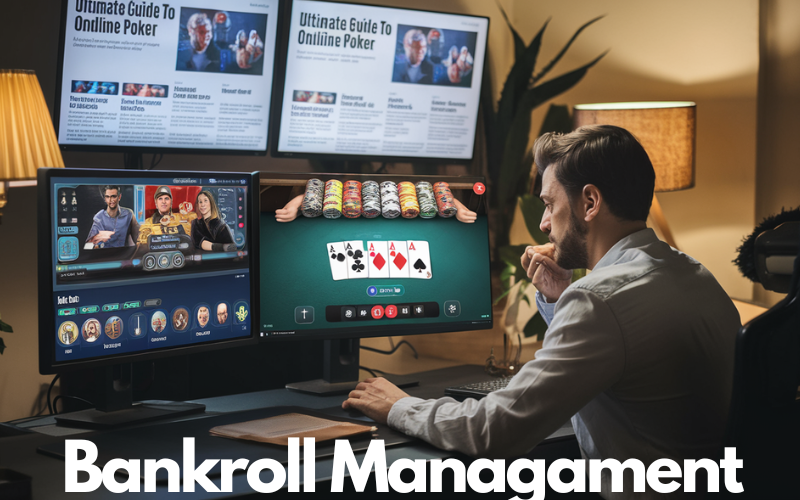Online poker has exploded in popularity over the last two decades, offering players the thrill of traditional game from the comfort of their own homes. While the game remains largely the same, there are specific strategies, skills, and tips that online poker players should know to increase their chances of success. This ultimate guide will walk you through everything you need to become a better online poker player, from understanding the basics to implementing advanced strategies.
Understanding the Basics of Online Poker
Before diving into tips and tricks for success, it’s crucial to understand the basic structure of online poker. Online poker games generally follow the same rules as live poker, but the format can be slightly different. Popular formats include:
- Texas Hold’em: The most popular variant, where each player is dealt two private cards, and five community cards are placed on the table.
- Omaha: Similar to Texas Hold’em, but players receive four private cards instead of two.
- Seven-Card Stud: No community cards, and each player is dealt seven cards, from which they make their best five-card hand.
- Sit & Go tournaments: Single-table tournaments that start once enough players join, typically with a winner-takes-all or tiered prize structure.
Once you’re familiar with the rules, you’ll be better equipped to handle various situations during a game. Understanding hand rankings, betting structure, and table positions are fundamental elements in succeeding at online poker.
Choosing the Right Poker Platform
Not all poker sites are created equal. Selecting the right platform is critical to your long-term success. When evaluating online poker sites, consider factors like:
- Reputation and Security: Opt for platforms that are well-established, licensed, and secure.
- Game Variety: Check for a wide range of games and stakes to suit your skill level and bankroll.
- Bonuses and Promotions: Most sites offer welcome bonuses, rakeback, and loyalty rewards. Choose platforms that offer favorable terms and real value.
- User Interface: A user-friendly interface can improve your playing experience. Make sure the platform is easy to navigate and works smoothly on your device.
- Player Traffic: More traffic means more games and softer competition, which is particularly important for newer players.
Developing a Solid Strategy
Success in online poker comes down to more than just luck. Consistent wins come from having a solid, adaptable strategy. Here are key components to develop:
Starting Hand Selection
One of the most fundamental aspects of online poker strategy is knowing which hands to play and which to fold. In Texas Hold’em, for example, strong starting hands include pairs, high-suited connectors, and high-ranking cards like Aces and Kings. Weak hands like unsuited, low-ranking cards should be folded more often than not.
By sticking to a solid starting hand strategy, you’re more likely to avoid tough decisions and difficult spots in later stages of the hand.
Position Matters
Your position at the table is a critical factor in decision-making. Players who act later in the betting round (late position) have more information and can make better decisions than those in early positions.
In general:
- Play more hands in late position, where you can observe your opponents’ actions before deciding.
- Be more conservative in early position since you’ll be acting without knowing what your opponents will do.
Bluffing Wisely
Bluffing is an essential skill in poker, but in online games, it should be used sparingly and strategically. Due to the anonymity of online poker, players may be more inclined to call a bluff compared to live games. Pay attention to your opponents’ tendencies and avoid bluffing into multiple players.
Consider using a semi-bluff—betting or raising with a draw (like four to a flush or straight) that has a chance to improve. This way, even if your bluff doesn’t work, you still have a chance to hit your hand and win the pot.
Managing Your Bankroll
One of the most overlooked aspects of online poker is bankroll management. Properly managing your bankroll ensures that you don’t go broke after a bad run of cards. A few rules of thumb for effective bankroll management include:
- Set a Budget: Only play with money you can afford to lose. Set a dedicated poker budget that won’t impact your essential expenses.
- Game Selection: Choose games that fit your bankroll. As a general rule, never risk more than 1-5% of your bankroll in a single game or tournament.
- Avoid Chasing Losses: It’s easy to become emotional after a series of bad beats, but trying to win back lost money often leads to more significant losses. Stick to your strategy, and if you’re feeling frustrated, take a break.
Adjusting to Online Play
Playing poker online is different from playing live poker in many ways. Here are a few adjustments that can help:
Multi-Tabling
One of the benefits of online poker is the ability to play multiple tables at once. This allows you to see more hands and potentially increase your winnings. However, multi-tabling is an advanced skill that requires strong focus and experience. Start with just one or two tables and gradually add more as you become comfortable.
Understanding Timing Tells
In live poker, players often give away tells through physical actions. Online, there are no physical tells, but timing tells can be revealing. For example, if a player takes a long time to act, it could indicate they are making a difficult decision. Conversely, an instant bet may suggest they are confident in their hand. Pay attention to these small details to gain insights into your opponents’ thought processes.
Using Software and Tools
Many online poker players use software to analyze hands, track opponents, and improve their strategies. Some common tools include:
- Poker trackers: These programs record your hand history and provide insights into your gameplay, helping you spot leaks in your strategy.
- HUDs (Heads-Up Displays): These overlays provide real-time statistics about your opponents, such as their aggression levels, fold percentages, and more.
Reading Your Opponents
Though you’re not face-to-face with other players in online poker, there are still ways to read your opponents. Observing betting patterns, raise frequencies, and how they react in different positions can help you build a profile of their playing style. There are generally four types of players to watch for:
- Tight-Aggressive (TAG): Plays few hands but bets aggressively when involved. Usually, this is a solid strategy, and they tend to be strong opponents.
- Loose-Aggressive (LAG): Plays many hands and bets often. While dangerous, LAG players can be unpredictable and often bluff.
- Tight-Passive: Plays few hands and rarely bets or raises. They can be pushed out of pots with aggressive betting.
- Loose-Passive: Plays many hands but rarely bets or raises. These players are generally weak, making them easy targets for more aggressive players.
Staying Disciplined
Discipline is essential for long-term success in online poker. This means sticking to your strategy, avoiding emotional decisions, and knowing when to walk away. It can be tempting to chase losses or get overly excited after a big win, but maintaining a calm and focused mindset will help you make better decisions overall.
Continuously Improving
Poker is a game of constant learning. To be successful, you need to keep improving your skills, whether that means reviewing your hand history, studying poker theory, or watching training videos. Joining poker forums, discussing strategies with other players, and keeping up with the latest trends can also give you an edge.
If you’re looking to boost your chances in the Matka lottery, check out our post on Top Strategies to Improve Your Odds in the Matka Lottery for expert tips and insights!
Conclusion
Mastering online poker takes time, practice, and discipline. By understanding the basics, adopting a solid strategy, and continuously improving, you can boost your chances of success at the virtual tables. From selecting the right platform to managing your bankroll, these tips and tricks will help you become a more confident and skilled online poker player. Remember, poker is a marathon, not a sprint, so stay patient and enjoy the journey as you work toward becoming a winning player.
FAQs
What are the risks of playing online poker?
The risks include financial loss, addiction, and the potential for playing on an unregulated platform. To mitigate these risks, practice responsible gaming, play within your limits, and choose trusted and licensed poker platforms.
Can I play online poker on mobile devices?
Yes, most online poker platforms offer mobile apps or responsive websites that allow you to play on smartphones and tablets. The experience is similar to playing on a desktop, though the interface may be slightly different.
How do I know if an online poker platform is safe?
Look for a platform that is licensed and regulated by a recognized gaming authority. Check player reviews, payment security measures, and the platform’s transparency with regards to terms and conditions.








